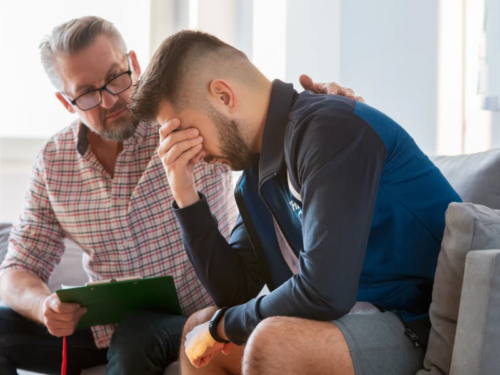
Table of Contents
Understanding the Mental Health Impact of Sexual Assault
Written By: Charlie Health Editorial Team
April 22, 2022
7 min.
Sexual assault can have a significant negative impact on mental health. It's important to understand the impact of sexual assault and to seek help if needed.
Learn more about our Clinical Review Process
Table of Contents
Sexual assault can happen to anyone, regardless of their race, age, income level, ethnicity, religion, or sexual orientation. Perpetrators of sexual violence can be acquaintances, family members, trusted individuals, or strangers.
The pervasiveness of sexual violence is real, with statistics that are unsettling. According to the United States Centers for Disease Control (CDC), more than one-third of women have experienced sexual assault, and one in six men will experience some form of sexual assault in their lifetime. In short, it is very likely that you know someone who has been sexually assaulted.
April is Sexual Assault Awareness Month (SAAM), which presents us with the opportunity to unpack what sexual assault is and how it impacts mental health.
What is sexual assault?
Sexual assault describes any sexual behavior that occurs without the consent of the victim. Sexual assault and sexual abuse are umbrella terms that include:
- Unwanted sexual advances: This may include unwanted touching, fondling, or attempted rape.
- Penetration of the victim’s body (rape): Forced sexual contact without a person’s consent. Rape includes forced sexual intercourse upon one who does not want it, is intoxicated, or is below the age of consent. Date rape is sexual assault that occurs between people in an established relationship. Some states also consider forced sexual acts, such as oral penetration, to be rape.
- Non-contact sexual abuse: Not all sexual abuse fits a psychological or legal definition. For example, parents who have sex in front of their children or make sexually inappropriate comments to children engage in sexual abuse. Revenge pornography sites, which publish pornographic images and videos of people without their consent, are another form of sexual abuse.
- Child molestation: Child molestation is any form of sexual contact with a child. Many children who experience this are too young to know what is happening, and some abusers use the child’s cooperation as evidence that nobody was harmed. Child molestation may include tricking children into a sexual experience or demanding sexual favors from a child.
- Incest: Incest involves sexual contact between family members. In most cases, incestuous sexual activity does not occur between consenting adults, and many reports of incest involve child abuse. Over one-third of American sexual assault survivors under the age of 18 are abused by a family member.
The term “force” does not just describe physical force. It can also include manipulation, emotional coercion, and threats to coerce an individual into non-consensual sex. In some cases, perpetrators may use threats to force a victim to comply, such as threatening to hurt the victim or other intimidation acts. Sexual assault also includes situations where a victim is unable to provide consent.
How common is sexual assault?
Sexual assault is tragically common. According to the Rape, Abuse, and Incest National Network (RAINN), one in six women and one in 33 men report experiencing an attempted or completed rape in their lifetime. On average, there are 463,634 victims (age 12 or older) of rape and sexual assault every year in the United States.
Although sexual assault can affect anyone, some groups face a higher risk of assault:
- People aged 12–34 face the highest risk of sexual abuse. Statistics show that one in nine girls and one in 53 boys under the age of 18 experience sexual violence or assault at the hands of an adult, and 82% of all victims under 18 are female.
- According to a 2014 report, nearly five percent of all women and one percent of all men on active military duty have experienced unwanted sexual contact. Nearly half of reports from women—and 35% of reports from men—involved penetrative sexual assault. Men in the military are 10 times more likely to experience sexual assault than civilians.
- The rates of sexual violence for LGBTQIA+ are higher than rates for heterosexual people, and hate crimes account for many sexual assaults against the LGBTQ+ community. Around 66% of trans people will experience sexual violence in their lifetimes, regardless of their sexual orientation or gender identity.
- According to the National Intimate Partner and Sexual Violence Survey (NISVS), the lifetime prevalence rates for rape are highest among multiracial women. Although racism can place people of color at a higher risk of sexual violence, survivors of color are less likely to report assault.
How does sexual assault impact mental health?

Sexual assault can have several short and long term effects on mental health. In many cases, sexual assault survivors experience flashbacks of their assault and feelings of shame, isolation, and guilt. Sexual violence can also lead to feelings of loss of control, difficulty concentrating, and overwhelming fear.
Sexual assault victims face a higher risk of certain mental health issues, including:
- Depression: After a sexual assault, victims may experience feelings of hopelessness, frequent crying spells, and even suicidal thoughts. According to a study on male sexual violence victims, nearly 19 percent of victims were diagnosed with depression following sexual assault.
- Anxiety: In the weeks and months following the assault, victims may experience feelings of general uneasiness or dread. In some cases, victims of sexual assault may develop a fear response, avoiding triggers (such as locations or situations) that remind them of the attack.
- Post traumatic stress disorder (PTSD): Victims may experience flashbacks, nightmares, or other painful emotions that remind them of the assault. Nearly one-third of rape victims develop PTSD and 81 percent of sexual assault victims experience PTSD symptoms one week after the assault.
- Eating disorders: Research suggests that survivors of sexual assault face a greater risk of developing eating disorders. Survivors may develop disordered eating as a coping mechanism after experiencing rape, molestation, harassment, and other forms of sexual abuse. Approximately 30 percent of patients with disordered eating also experienced sexual abuse in childhood.
- Substance use disorders: Some sexual assault survivors turn to substances to feel better, escape their emotional pain, or cope with confusion about the assault. According to the Pennsylvania Coalition Against Rape, victims of sexual abuse are 26 times more likely to have major drug abuse problems.
It’s also common to experience relationship disruptions after a sexual assault. Survivors of sexual assault may withdraw from loved ones and/or experience embarrassment about what happened to them.
A previous history of assault and negative reactions from the local community can exacerbate the impact of sexual violence on mental health. Because sexual assault can have such a serious impact on mental health, it’s important to seek professional support to address trauma.
What can we do to prevent sexual assault?
We all have a role to play in raising sexual assault awareness and prevention. The more we are united in our understanding of sexual assault and sexual trauma, the more we can promote shared responsibility and community accountability. As we witness global community-based prevention efforts, committing yourself to the prevention of sexual assault is more important than ever.
And ultimately, the primary way to prevent sexual assault is to not sexually assault another person. Full stop.
Some prevention efforts you can practice include the following:
- Speak up if you hear someone make a joke about sexual assault or rape, or if they make a comment that blames a victim for their experience of sexual violence. Words have immense power.
- Intervene in a safe way if you notice questionable or problematic behavior, such as sexual harassment. The National Sexual Violence Resource Center (NSVRC) offers Bystander Intervention tips here.
- Be more intentional with your social media use. The next time you see social media posts promoting sexism, racism, homophobia, or any other bias that allows assault to thrive in our society, step in and start a conversation.
- Create safe online spaces that promote digital consent, inclusion, and safety.
- Teach young children and adolescents about the importance of consent.
- Volunteer for sexual assault prevention organizations or local rape crisis centers.
- Start conversations about sexual assault awareness with people you know.
- Reach out to survivors of sexual violence to check in and show your support.
- Sign up for sexual violence prevention training to protect yourself and avoid being a bystander. Many college campuses offer special training for college students.
- Share confidential hotlines and sexual assault services with people in your life.
At Charlie Health, our goal is to ensure the effective delivery of care for all clients. As such, we are unable to accept clients with any eating disorder as a primary diagnosis at this time.
Don’t hesitate to reach out for help.
Sexual assault can take many forms, but it is never the victim’s fault. You are the only one allowed to make choices for your body.
If you or someone you know is experiencing sexual trauma, it’s important to know that there is hope. And experiencing related mental health issues does not make you “weak” or “broken. Treatment is available, and recovering from trauma is possible.
Contact Us
At Charlie Health, we offer virtual mental health treatment for adolescents, young adults, and families experiencing mental health crises. Our intensive outpatient program (IOP) combines trauma-informed therapy, group sessions, family therapy, and can arrange access to psychiatric support (if needed) to help you build resilience and start healing.
No matter where you are in your mental health journey, we’re here to help. Our team of supportive, experienced mental health professionals will help you find emotional support, regain strength, and start feeling better.





